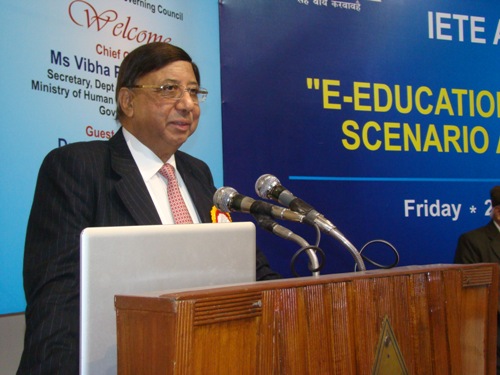23 Dec 2011|Noida | Lodi Road, New Delhi.
With E-Education, Class room lecture will slowly be eliminated in the near future – says Dr. Ashok K. Chauhan, Educationist & Founder – Amity Group of Institutes” at Seminar organised by The Institution of Electronics and Telecommunication Engineers

India is a nation of 1.2 billion people. Country faces challenge in imparting education to large section of society. Conventional education system has its limitation. E-Education can overcome challenges of content and quality human resource availability. Leveraging Information & Communication Technologies (ICT) in education will go a long way. To discuss the future of education, The Institution of Electronics and Telecommunication Engineers (IETE) organized a seminar titled E-Education Paradigms – Indian Scenario and Challenges at Lodi Road, New Delhi.
Dr. Ashok K. Chauhan, Founder President of Amity Group of Institutes, Ms. Vibha Puri Das, IAS, Secretary – Dept. of Higher Education, Ministry of Human Resource Development, Govt. of India, Prof. M. Jagdeesh Kumar, IIT Delhi, Mr. R.K. Gupta, President, IETE inaugurated the seminar.
Guest of Honour on the occasion, Dr. Ashok K. Chauhan, Educationist, philanthropist and Founder President of Amity Group of Institutes in his address said, with the emergence of e-education, the time for class room lecture will be eliminated very soon. We can foresee that with the advent of Information & Communication Technologies, the education paradigm will be completely changed. Dr. Chauhan said that India has more than billion population wherein 65% are below 35 years. Through the new education technologies we can revolutionize not only our country but the whole world. We should consider population as an asset and not a problem. Dr. Chauhan opined that ICT enabled education will provide education to remotest part of country. Dr. Chauhan informed the august gathering that Amity University is offering e-learning education to 53 countries of Africa and more than 7,000 students are benefiting from this e-learning. Dr. Chauhan said that it is very difficult to make industry ready students until industry and academia does not come together.
Ms. Vibha Puri Das, IAS, Secretary – Dept. of Higher Education, Ministry of Human Resource Development, Govt. of India said that most important key word is equitble distribution of education. It is important to ensure that more students go for higher education. It is estimated that in next decade around 45 million students will be going for higher education. Ms. Das said that government had adopted 4 fold strategies – policy, framework, connectivity and content in this regard. Ms. Das informed that National Mission is being implemented from last 3 years and around 2 billion dollars had been spent in connectivity. We are on a threshold of optical fibers. Ms. Das said that we have to bridge the gap between science and social science. 419 universities and 6,000 colleges are already connected through broadband connectivity. We have to ensure that education reaches to the unreachables. Ms. Das opined that now there is a time for collaborative education. Students should get benefit of teaching from not only one institute but also other institutes. The power of technology can democratize the education.
Prof. M. Jagdeesh Kumar, IIT Delhi said that building world class institutes require decades of efforts. There is large mismatch between what we require and what we have. Prof. Kumar while raising the question said that can we use technology to meet the aspirations of students. There is tremendous competition and we have plethora of competitive exams. Prof. Kumar advised that we should completely move to online examination system.
Mr. R.K. Gupta, President, IETE said that India is heading towards education revolution and it is a great opportunity for we as an educationist and researcher to see and feel to be part of this revolution. Eleventh Plan is educational plan for India. Mr. Gupta said that content and connectivity are two issues important for e-learning. India is a vast country, we have many engineering colleges but there is lack of quality education. Universities like Amity and IIT has good faculty, if we can connect the lectures of Amity and IIT to other institutions than all students will be benefited.
Senior members from Amity Group, engineers, researchers, students were present during the occasion